|
It was not too long ago that I learned the extremely valuable lesson of not worrying about things outside of my control, as they keep me from enjoying the good. And what great timing it was to learn this before a global pandemic. There are so many aspects of life that are outside of our control now due to the virus, and after I learned that lesson I found myself quickly trying to take control over the parts I could and make them worth every minute. After all, I did just learn this great lesson that, essentially, seems to solve many problems. I started to take time out of my day to plan the goals I wanted to reach, making sure I would have every second filled so I would not succumb to the quarantine lag. I started waking up excessively early even though classes were not until noon, made sure I would be outside every day for exercise or a breath of fresh air, started eating three meals a day when I would never eat breakfast before, and even spent three hours practicing Calculus so I could “be ahead of the game when college comes in the fall.” At night, I would not allow myself to relax with any screen time—if I was on a screen I was either practicing Spanish on Duolingo or putting reminders in my phone for things to do the next day. Each day was just a constant cycle of doing. Obviously, it felt great to know that I had learned the lesson of taking control of the things I could and not worrying about anything I couldn’t. However, what I neglected to realize is that, while this lesson is effective on any regular day, my life was no longer normal anymore. Essentially what I was doing was taking my life in quarantine and creating a façade of normalcy. It was such an attempt at fake normalcy that I was doing things I wouldn’t even do during my pre-pandemic life. I soon learned to embrace quarantine not as my only chance to get ahead of life, but rather an opportunity to actually relax with virtually no repercussions. While I believe many of us can take this time to step away from our preconceived notions of success and normalcy , it is still important to do activities to keep your mind, body, and spirit stimulated as long as these activities do not take over your day. Try out prayerful meditation, pick up that hobby that you always wanted to do but never had time for, talk to your family, take time to reflect, but most importantly make sure that whatever you’re doing is for YOUR health and betterment—not for your grades, your job, or your friends. The world has no choice but to resume slowly, and you will have time to get your normal obligations taken care of. I encourage you to use this time to step outside your comfort zone and do things that fill up your mental, physical, or spiritual tank. Then, when we begin to reembrace normalcy, we will be better prepared to share what we’ve learned and who we are with our world.
0 Comments
“What is man that you are mindful of him or the son of man that you are for him?” Ps. 8:4 In a time such as this, in the middle of a worldwide pandemic, many people are tempted to ask questions: Why is this happening Lord? What will become of me? Have you forsaken us? Do you still care for us? As Catholics, we need only to search the holy scriptures to find our answers. Isaiah 41:10-13 says “For I am the Lord, your God, who takes hold of your hand and says to you, do not fear, for I am with you; be not dismayed, for I am your God, I will strengthen you, I will help you, I will uphold you with my victorious hand.” In the midst of overwhelming craziness, staring down the face of so many unknowns, this verse gives me such comfort! I read it and remember the Israelites wandering in the desert for a very long time, not knowing how or when they were going to be delivered to the Promised Land, and it puts this situation in better perspective. From history, these people were fed and their needs provided for because God promised He would help them. I do not need to know when this specific disease will be eliminated. I do not need to know how long my ‘normal life’ will be turned upside down. I do not need to worry if my basic needs will be provided for. I have a promise from the Almighty. His promise is unbreakable and everlasting. So where does my anxiety come from? It comes from not leaning on His strength, not trusting in His provision, not resting in His perfect love. I need to spend my time praising and thanking Him for the fact that He cares about every minute detail of my life and has told me He will not abandon me – unequivocally! Upon my rising, I must choose to be grateful for another day to live in service of my husband, my children, and my neighbors. When I begin in gratitude, I can step forward into the day with all it’s uncertainties and live in peace, not in fear. “Cast all your anxiety on him because he cares for you.” 1 Peter 5:7 When I recall that God cares for each of us with a love that is perfect, this knowledge begins to settle in my heart and permeates my soul. It is an act of surrender – to cast my human weaknesses on Him and go about the duties of my day with a disposition of peace and hope. St. Paul reminds us in 2 Timothy 1:7: “For the spirit God gives us does not make us timid, but gives us peace, love and self-discipline.” This applies to all of us – not just the people in Ephesus a couple thousand years ago! God’s love is timeless, limitless, and eternal. It is beyond our human comprehension. It requires us to choose to believe and experience Christ’s love within us. You see, we have more important things to be doing than spending our time questioning, worrying, wondering, lamenting, and fearing. He reassures us over and over that He is near, is helping us, and is carrying us. We have evidence of His care for us in the many selfless people on the front lines serving our medical needs, manning our stores, and delivering our supplies. They are God’s love made manifest in this crisis. It is our choice to decide that we will believe this and trust moment by moment that His promise is true and secure. We don’t have to fully understand it – because we won’t – but in order to live in serenity with a calm mind, we must choose to walk in complete belief. We can accomplish this amidst great trial, because He is our helper and our strength, our strong tower. As we live in the disposition of faith that God will care for us in all circumstances, we can reach out to those around us and share this magnificent gift. We can be His hands, His voice, or His smile to quell the fear in another. This is our call as Christians – to wholeheartedly believe and to unconditionally share it with everyone. It seems so simple. And it is – when we devote ourselves to prayer and fasting and Scripture reading. We are afforded so many wonderful ways to do these. We have our Bibles in book form, on our tablets and phones. We can stream Masses being offered in churches all over the world right from our couches. There are numerous holy men and women who speak and write about God’s promises that we can listen to or read. In our progressive digital age, it is amazingly easy to immerse ourselves in material that will strengthen our belief and encourage us in the truth of God’s care for us. How fortunate we are! We can go about our days, in the middle of great strife, with confidence that God is mindful of us, each and every one of us. “Whoever trusts in the Lord is kept safe.” Proverbs 29:25 Still, because I am just a mere mortal with lots of frailties that can derail me from the Godly path, I keep reminders on the walls of my home to keep me focused on this truth. A wooden sign that reads ‘Expect a Miracle’ hangs in my family room. The Good Shepherd cradling a sheep hangs in my dining room. Pictures of the Sacred Heart of Jesus and the Immaculate Heart of Mary hang over my bed. The face of Jesus hangs in my living room. Crucifixes hang in every room. These are my personal visual reminders of the love of God that help me keep my eyes on Him, my heart comforted, and my mind at peace. I recommend everyone find tangible ways to stay connected to this truth so that we can be disposed to share it with others. It is when I live from this mindset that I can sing with total confidence that it is well, it is well with my soul! “Consider it pure joy, whenever you face trials of many kinds, because you know that the testing of your faith develops perseverance. Perseverance must finish its work so that you may be mature and complete, not lacking anything. If any of you lacks wisdom, he should ask God, who gives generously to all without finding fault, and it will be given to him. But when he asks, he must BELIEVE and not doubt.” James 1:1-8 Who are we that God cares for us? We are His. He thought us into being because He is love and He wants to share His love with us for time and eternity. That is a comfort and a confidence I can rest in! This is the Savior who is mindful of me. Thank you, Lord! Continue to shower me with the grace to walk steadfast in my belief. No matter the trials or circumstances, God is with us and all will be well. When I made the shift to working from home almost a month ago, I was excited for a change of pace: sleeping in, a 30-second commute from my bed, working in pajamas all day, not packing a lunch. But when it came down to it, I became restless and had trouble settling down. Focusing on work was difficult. Being productive did not come easy, with my mind wandering for much of the workday. I had embraced the idea of a change of pace, but not the realities of what that change really meant.
Prayer, when I remembered to make time for it, was similarly difficult to settle into. It took me some time to realize what was happening, in part because I work in a secular field. Since I don’t spend my workdays in the Church sphere, I don’t have many explicit or subtle reminders that point my day toward God. Meetings don’t begin with a prayer. My daily tasks and conversations with colleagues don’t revolve around Church activities and ministry. I don’t interact with my pastor or bishop over the course of my day. And though I’ve made an effort over the years to weave prayer and reminders of God into my daily life, my routine has been disrupted. So, naturally, my prayer life has gone out the window. Another piece to mention is that I live alone. Normally, I have a number of social engagements in the evenings and on weekends, often with Catholic friends. Our interactions have a shared Catholic identity baked in and serve as additional reminders of faith. Now that I’ve been largely alone for a month, my days seem to blur together. It's become easy to turn in on my own thoughts and seek out distractions to numb the collective grief we’re all feeling: the loss of normalcy and a sense of security, cancelled plans, and the uncertainty of when we’ll return to some semblance of normal. And in the midst of that, I forgot to pray. It dawned on me that I’ve been given an opportunity and a challenge: I’ve been thrust into an unchosen solitary monastic existence. I have the once-in-a-lifetime chance to completely re-invent what “normal” looks like for me in almost every way. While I owe the company 8 hours of my day, 5 days a week, everything else is mine to do with as I wish. I have a blank canvas. I don’t have to dress for work, shave, or drive to and from the office. I don’t have a spouse or children to care for, no roommate, and no one to interact with here in my home... except God. If I choose to, I can rebuild “normal” with a different foundation and framework, one centered on God. But I don’t have to be a full-time hermit in order to do this well. It’s a lesson that came to me in the midst of prayer and reflection during the Paschal Triduum. Something in me tends to go too hard during Holy Week, especially on Good Friday, and I feel a need to do as much as I can to enter into the sacrifice of Calvary in solitude. Once the quiet of Holy Saturday came around, though, I realized that in the inner urgency to “do” Holy Week so well on my own, I’d forgotten to “be” in the presence of God. Here I was, waiting for Easter with nothing left to do and no one to do it with. All the prayers and meditations had been said, all the fasting was ended, and all I could do was sit and wait. It was a striking reminder that, oftentimes, we need to just be and make room for God to do some work in our lives. Archbishop Wilton Gregory, in his homily on Easter Sunday, noted how important the concept of time is to the story of our salvation, and that Easter “resets the clocks and calendars of our lives.” It's especially true in these days of being forced to reduce the externals. We have an opportunity and a choice here: to either enter into the quiet and craft something meaningful in our lives, or to just make more noise to drown out the vastness of that quiet. We’ve been making a lot of noise lately, often without realizing it. Thank God for the recent reminders of the power of the phrase, “Be still and know that I am God.” May we all take advantage of this opportunity to hit “reset” and allow God to direct us in those quiet moments. When we re-enter the world in a “new normal”, may we use the lessons from this time of isolation to shape what that normal really ought to look like. Jay Schaefer is a Professional Engineer in Baltimore, working to maintain and improve the region's transportation infrastructure. He sings in his parish choir and is involved with the Knights of Columbus. Jay is also a former staff member and current collaborator of the Catholic Apostolate Center. 4/7/2020 Spiritual Friendship: Accompanying College Students During COVID-19 | COVID-19 ResourceRead NowA few of my staff colleagues and all of our interns at the Catholic Apostolate Center are undergraduate students at The Catholic University of America. We, like university students across the country, find ourselves doing remote coursework, dealing with unresolved goodbyes that were meant for a week of break and not months of uncertainty, and the seniors are facing the reality of a delayed, if not completely cancelled commencement. Jonathan Sitko, Assistant Director of Programs for the Catholic Apostolate Center, recently wrote a blog post titled “Accompaniment in Isolation” in which he said, “Each one of us is called to accompany others on the journey of faith. Christ himself modeled this with his disciples and has charged us to do the same. Accompaniment is fundamental to Christianity.” In this time of great uncertainty, I think of my friends, university community members, and all of the college students across the country who are in need of exactly this—of accompaniment. The Art of Accompaniment: Theological, Spiritual, and Practical Elements of Building a More Relational Church reminds us that, “Accompaniment is not for a few ordained or specially commissioned lay ministers; it is a call put forth to all the baptized by the Spirit of God.” I hope that our campus ministry programs are finding ways to accompany students in these times through personal communication when feasible, opportunities for virtual community, and streamed prayer opportunities. These are important and stress the nature of community within our campuses and the desire for students to regain a sense of normalcy in a situation that is so abnormal. The efforts of our campus ministries cannot lead us, the baptized- students, friends, and community- to sit passively. The call that we as students receive in this time of crisis is a call to accompaniment, empowered by the Holy Spirit in Baptism, strengthened at Confirmation. We turn our attention to the dimension of spiritual friendship that the Art of Accompaniment reminds us is, “Like two friends who travel together, this spiritual journey is not undertaken through the sharing of experiences, a character of warmth and tenderness, and involves catching sight of the action of God in the lives of one another.” We are all, in some way, grieving the loss of the life that we once held to be normal; we are all experiencing change, uncertainty, and unrest; and we are called to accompany one another through that. This distinct dimension of accompaniment reminds us that accompaniment is not a hierarchy, that there are not ranks or levels, but that we can accompany in mutuality and reciprocity, as friends, as Jesus calls us to be. St. Vincent Pallotti believed that in our spiritual weakness, God communicates his infinite mercy to us. But in times of great unease, it can be hard to hear him. Accompaniment allows us to dialogue together so to best hear his voice, to pray together for the greatest needs and hopes that we hold, and to witness hope to one another—hope that springs eternal from Christ himself who is alive, who loves us, and who saves us. Here are some suggestions for how college students can accompany one another during COVID-19:
For other reflections to accompany you during this time, please click here.
|
Details
Archives
July 2024
Categories
All
|
About |
Media |
© COPYRIGHT 2024 | ALL RIGHTS RESERVED

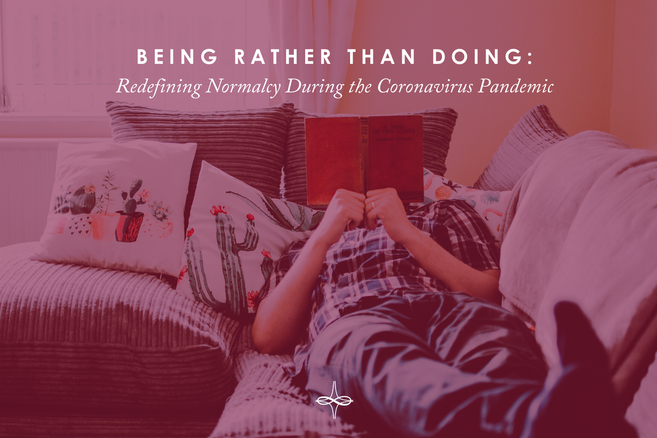

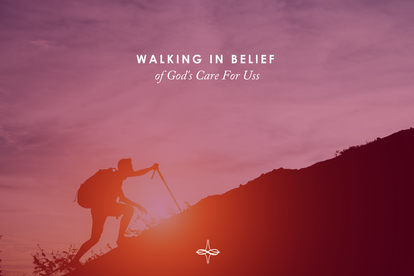

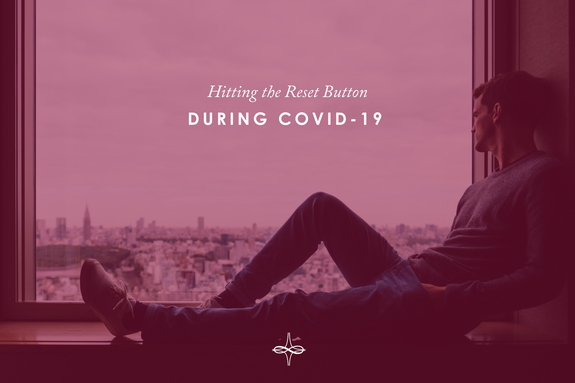
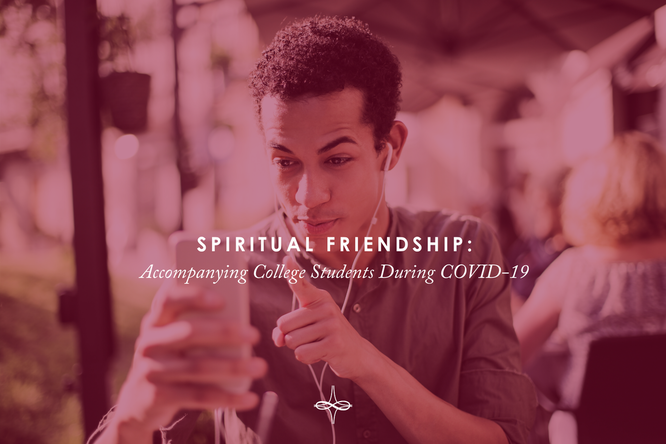
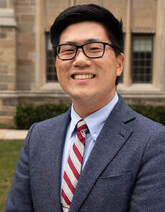
 RSS Feed
RSS Feed